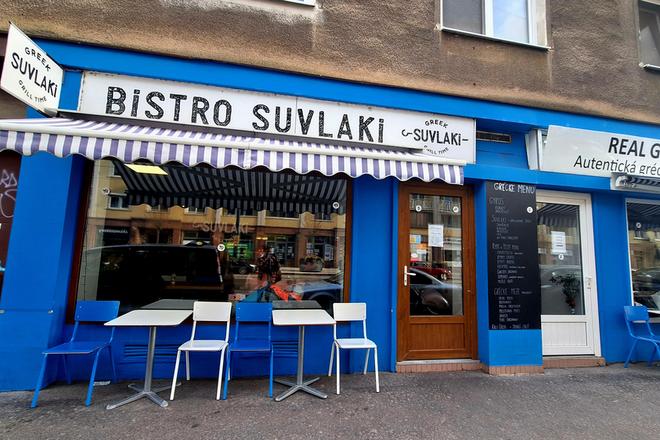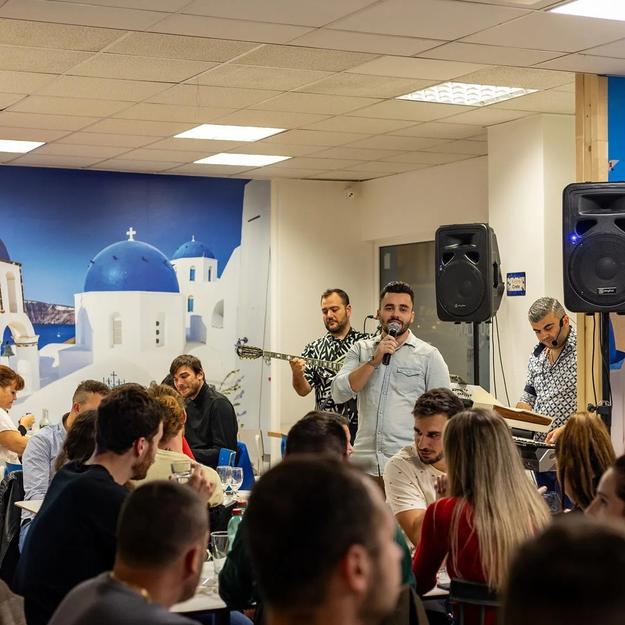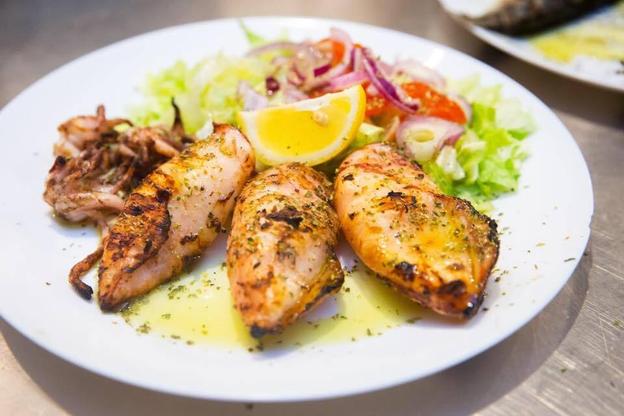Slightly undecided, I had been staring at a menu board above my head for a few seconds when a man greeted me and said, “Try vegetable soup.”
Starving, I quickly nodded to this simple proposal from the friendly man, who turned out to be a Greek waiter. His name was Christos. He then took me over to the counter and pointed to some moussaka, which can be described most simply as eggplant lasagne, and tried to persuade me to have some. Honestly, I didn’t need much convincing: I would have eaten anything on the Saturday night I paid my first visit to Suvlaki, Bratislava’s only Greek bistro, including the hearty meal suggested to me just seconds earlier.
“Okay,” I said to Christos – and to Greece’s national dish.
I seated myself at a table near the counter and beneath a television that hung from the white wall. Songs by Greek artists such as Antonis Remos and Pashalis Terzis were blasting out from it as I ate and observed Christos welcoming other customers to the venue (in between, he showed me how to make a crab out of a Greek beer bottle cap).
“You like it, my friend?” Christos’ Greek colleague later asked from behind the counter about my moussaka.
The small bistro in central Bratislava, a stone’s throw from Comenius University’s medical faculty, is named after a classic Greek dish. Souvlaki, which has become one of my favourite orders on food delivery apps, essentially comprises small pieces of meat that are grilled on a skewer and eaten directly from the skewer, or served with pita (a Greek flatbread), chips and tzatziki sauce.
Situated on Krížna Street, just a few steps from the Americké námestie (American Square) tram stop, Yiannis Fanourakis opened the city’s only Greek restaurant almost a decade ago. That wasn’t his original plan at all, at least not at first. The chef, who hails from Crete, says that he initially came to Bratislava to make some extra money by cooking at different restaurants.
“However, I noticed that Bratislava lacked a Greek restaurant,” he says.
‘A bit of everything’
The restaurant is a dream come true for him. The chef says he always wanted to run a small restaurant business where he could greet customers with a warm welcome.
Greeks, Ukrainians and Slovaks all work at the bistro. Fanourakis himself takes on different roles in his restaurant. In addition to being a chef, he is also a manager. These roles vary depending on what needs to be done, he explains.
“I’m a bit of everything,” Fanourakis laughs, stressing that this is not a complaint.
Having lived in Slovakia for almost 20 years, he says that several people have tried to open a Greek restaurant in Bratislava. Past attempts apparently failed. But the catering scene on Krížna Street has evolved. Today, there’s a French restaurant, an American pizza restaurant and an Italian restaurant too.
“I love it. There’s more restaurants and more people coming here,” says the owner.
Because the bistro is located on a busy street and near the university, many people come in to grab a meal on their way past.
“I had planned on opening a second bistro, but then there was the possibility of expanding this one. So we went for that instead,” the Greek notes.
Greek vibes
The menu at Suvlaki pays homage to Greek cuisine. Herbs, fresh produce and, most importantly, olive oil are its essential ingredients. In addition to souvlaki and moussaka, the bistro serves seafood such as fried anchovies (gavros), octopus and grilled calamari. Gyros, one of the most popular Greek street food dishes, and dakos, a traditional salad from Crete, are also served at the bistro.
The bistro is, moreover, known for its family atmosphere. Many people appreciate this and regularly return here. Adam, a Slovak who works in real estate, is one of them. He has been coming back to the bistro for four years.
“They make me feel welcome here,” he tells me in a brief conversation outside the bistro on a sunny Monday afternoon as he enjoys his grilled calamari.
However, he confesses that shrimps in tomato sauce with feta cheese is his favourite meal at Suvlaki.
As Fanourakis explains, he’d like to take people to the streets of Athens and to the shores of Crete through the meals he and his colleagues prepare at the restaurant.
The easy-going waiters and chefs add an extra layer to the Greekness of the cosy venue. They come from different regions of Greece and regularly share stories and traditions with customers, creating a new kind of connection that goes beyond the plate.
“In the last six months, we’ve been organising Greek Evenings once a month,” explains Fanourakis. “So far, it has been fantastic,” he adds. People dance, sing, laugh, and the Greek staff share stories and traditions with our mostly Slovak customers. “We throw napkins in the air and plates on the floor. That’s how we do it in Greece,” says the chef. Tossing napkins in the air signals wealth or, some say, freedom. Ancient Greeks used to toss money in the air. The smashing of plates, often accompanied with the expression ‘Opa!’ (Watch out!), is believed to bring good luck and ward off evil spirits.
But it’s also the hum of conversation, Greek music, and the clatter of plates that add up to the atmosphere and bustling energy of the Greek bistro. Last but not least, blue chairs, whitewashed walls and the pictures of Greece also enhance the Hellenic vibes at Suvlaki.
Compared to the past, when Fanourakis says Slovak people were afraid of tasting Greek specialities, the situation has changed for the better. He attributes this to the fact that more people travel: Greece is now a popular summer destination for many Slovaks.
“They like all of [our specialities] now,” he declares proudly.
A Greek mother who loves Slovakia
Fanourakis had travelled a lot before settling down in Slovakia, working in several restaurants in Greece and America. Looking back on his experience here, the chef says that life in Slovakia has been good to him.
“I really can’t say anything bad. It’s a calm place, and I feel safe,” he says with a smile on his face, adding that the country feels almost like home.
However, he misses the sea and his family. The Greek community isn’t large in Bratislava: there are about 500 Greek citizens, mostly students, Fanourakis estimates. So when his mother, Despina, visits, it’s always a joy for him. Fortunately, they’re not short visits; she stays in the city for several months and helps her son in the restaurant. She’s been visiting Bratislava since his bistro opened.
“I like Bratislava and Slovakia very much,” Despina tells me in a short conversation during her lunch break – before she rushes off back to work.
Zuzana Rusnáková contributed to the reporting.


 The Greek bistro Suvlaki on Krížna Street in Bratislava. (source: Peter Dlhopolec - The Slovak Spectator)
The Greek bistro Suvlaki on Krížna Street in Bratislava. (source: Peter Dlhopolec - The Slovak Spectator)
 A Greek evening at Suvlaki. (source: Facebook)
A Greek evening at Suvlaki. (source: Facebook)
 A Greek specialty. (source: Pixabay)
A Greek specialty. (source: Pixabay)